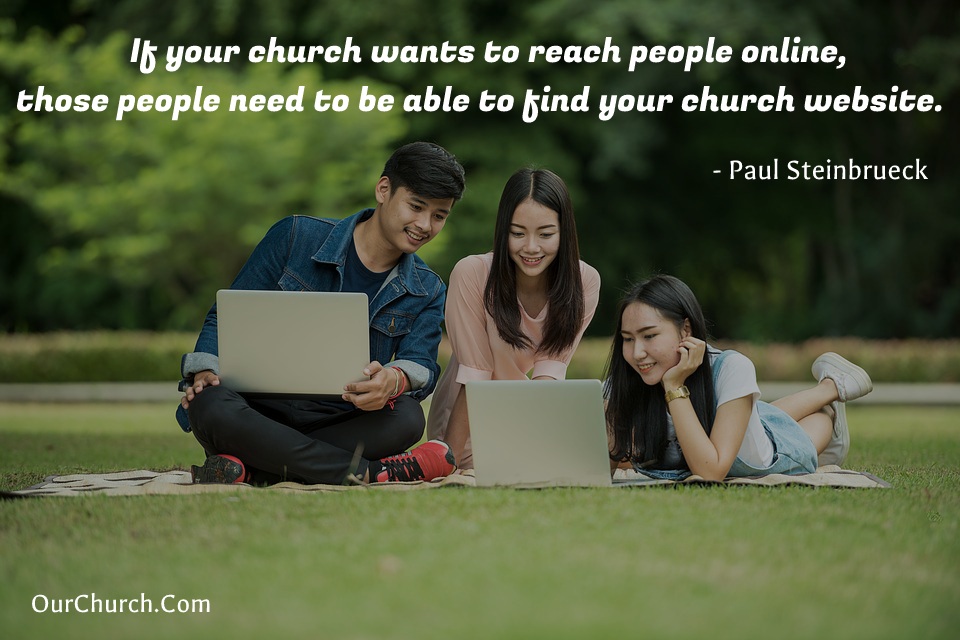In part 3 of our series, What is Church SEO? we discussed the 3 Ways to Improve Church Search Engine Results. One of those three ways is by improving your position in the organic search results.
Google’s search algorithm looks at more than 200 different factors to produce its search results. A person could spend years analyzing and optimizing all those factors, so in this article we’re going to focus on the factors that are most important so you can make the best use of your time.
Before we get to the specific ranking factors, it’s important to understand the general concept of how Google ranks websites for each search query, aka keyword.
Relevance x Authority = Search Ranking
All 200+ search ranking factors can be put into one of two categories – relevance or authority.
- Relevance is how closely related a web page is to the search query. Search engines look at the text, headings and other elements on a web page to determine what that page is about, and how closely related it is to a search query.
- Authority is how reliable, reputable and important a web page is. Search engines look what other sites are linking to or mentioning a website, who is posting links to the site in social media and how often, how much quality content is on the website.
If a web page’s content is not related to a particular keyword, no matter how high its authority is, Google is not going to show it in the search results. If a web page is closely related to a certain keyword but has low authority because few other sites link to it, Google will display it in the search results after web pages that are also relevant to the keyword but have more authority.
Therefore, for a web page to rank well in the search results for a keyword it must be very relevant and have more authority than other relevant web pages.
Church Keywords
Before you can optimize any web page, you have to know what keyword(s) you want to make the page more relevant for. We call these your target keywords. For other types of organizations this usually requires keyword research to compare how often various keywords are searched for and how competitive they are, but for churches, there are 3 keywords that are far more popular than any other:
- Churches in [your city]
- [your city] churches
- [your city] church
If there are cities with the same name in other states, then your top keyword might be “churches in [your city, your state]” or “churches in [your city, state abbreviation].”
If your church includes people from multiple cities you can also try to target “churches in [adjacent city].” We don’t target more than 2 adjacent cities because it’s difficult to fit all those keywords into the various parts of the web page that can be optimized.
Some churches also choose target keywords related to their denomination or style of church like “Baptist church in [your city]” or “traditional church in [your city],” but a lot fewer people search for these keywords.
Church SEO to Improve Relevance
Once you know what keywords you want to target, the next step is to try to work those keywords into the parts of the web page that can be optimized. We recommend optimizing the following page elements:
- Title tag – This title is hidden from visitors but read by search engines and usually used as the name of the organization in search results.
- Meta description tag – This description is hidden from visitors but read by search engines and usually used as the description in the search results.
- H1 tag – The largest heading on the page
- H2 tag – The second largest heading on the page
- Text – Regular text on the page can be modified to include targeted keywords several times, but it’s important to remember that your primary audience is still human readers. Don’t make sound awkward for the sake of SEO. And don’t overdo it.
- Image alt and title attributes – Images can be given alt and title attributes that are read by screen readers for the visually impaired and search engines.
- Header/footer – One of the easiest and most important things you can do to improve relevance is to include the name of your church and its address in the header or footer of your website so it appears on every page of your website.
Church SEO to Improve Authority
Improving the authority of a website is much more difficult and time consuming than improving its relevance. For this reason, we always improve a website’s relevance first before we start working to improve its authority.
Here are some things that can be done to improve a website’s authority.
- SSL certificate – An SSL certificate encrypts data sent to and from a website. Google now gives websites with an SSL certificate a slight rankings boost.
- Links – When one website links to another website, Google sees that kind of like an endorsement or vote for the linked-to site. Generally speaking the more sites that link to your website the better your search rankings. The authority of sites linking to your site also matters. A link on high-authority site like your local newspaper is going to help your website’s authority much more than a link from a low-authority personal blog.
- Local/directory listings – Getting your church listed in directories like YellowPages and church-related directories, is an easy way to get links to your website on high-authority sites. We’ll discuss link building and directory listings in more detail later in this series.
- Quality content – A website with lots of well written articles is more of an authority than a website with 7 pages that talk about the church and what it does. This is why better search rankings is one of the many benefits of blogging.
- Social media – While most SEO experts do not think sharing links in social media directly helps improve authority and search rankings, the more people who are aware of your website, content and events, the more people will post links to your website that do have an impact.
With this guidance you should be able to optimize your church website and improve its organic search rankings. After all…
If your church wants to reach people online, those people need to be able to find your church website.

If you want to save time and effort and make sure it’s done well, let our church SEO team at OurChurch.Com take care of this for you. Complete the form below to get more info or schedule a call.
Comment Below and Discuss
- What comments and questions do you have about improving your church’s organic search rankings?
Read more articles in our What is Church SEO? series.



4 Comments
A website to rank well in the search results for a keyword it must be very relevant and have the most authority.
Where do I find the meta description tag on my site? I’m sure I have seen it before, but I can’t find it now. I have a WP-EZ site (migrated from the older web builder). On the “More” menu in WP-EZ, there is an “SEO” button, but when I click on it I get a page titled WordPress>Error and it says, “Sorry, you are not allowed to access this page.” Is this something I am supposed to be able to access, or is this reserved for OCC? (www.fellowshipfreewill.com)
Thank you.
Hi Jean, thanks for pointing out the access issue with the More -> SEO page. There are some SEO features there that you should have access to. I’ve notified our development team of the issue, and will post a comment here to let you know when it’s been resolved.
Both the title tag and meta description tag can be set for each individual page on the same screen as you edit the page. If you scroll down below the main editor, you’ll see a “Yoast SEO” heading. Below that click the “Edit Snippet” button.
Hi Jean, the access to the More -> SEO admin has been fixed. Unfortunately, it looks like we don’t have a video tutorial for those SEO tools yet. I’ll make it a priority to create one soon. But we do have this video tutorial showing you how to optimized web pages:
https://www.ourchurch.com/support/index.php?/Knowledgebase/Article/View/587